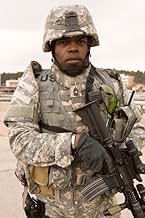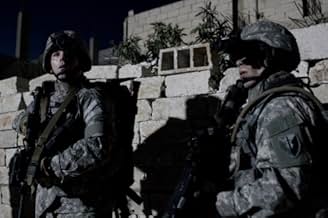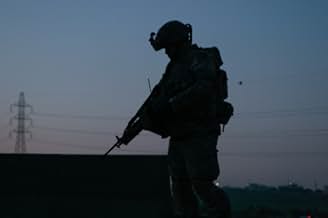The devastating reconstruction of the rape and murder of a 15-year-old Iraqi girl by American soldiers in Samarra in 2006.The devastating reconstruction of the rape and murder of a 15-year-old Iraqi girl by American soldiers in Samarra in 2006.The devastating reconstruction of the rape and murder of a 15-year-old Iraqi girl by American soldiers in Samarra in 2006.
- Awards
- 6 wins & 2 nominations total
Anas Wellman
- Soldier
- (as Anas 'Tipsy' Wellman)
Happy Anderson
- Battalion Commander
- (as Eric 'Happy' Anderson)
- …
- Director
- Writer
- All cast & crew
- Production, box office & more at IMDbPro
Featured reviews
Redacted (2007)
* 1/2 (out of 4)
U.S. soldiers working at a checkpoint in Iraq see a 15-year-old girl, which gets them hard so they eventually rape her, murder her and her family and then set them on fire. It's really hard to judge this movie because on one hand it's pretty well made but that's no excuse for the propaganda coming at you every single second of the film. There's no question this is an anti-Iraq movie made by anti-Iraq people and that's why we see the things we do. Every negative heard about American troops is on display here, which is why this film is so one sided and why I couldn't enjoy the movie. I don't give a rats butt what ones opinion on the war is but a movie needs to be open and look at all sides of an issue but this is just like a Michael Moore film as we see one side and that's the side of the director and not necessarily a side with all facts. The American soldiers are all show as crazy, raping idiots who would probably be too stupid to have a job if they weren't in the Army. Is this a good way to show troops? The Iraqi people are shown as innocent victims yet we never see the ones going around blowing innocent people up. Wait a minute, we actually do in the film when one soldier has his head cut off but the film shows this as the right thing to do to the soldier. I could go on and on about this political propaganda in this film but the actually rape case is something DePalma did before with his Vietnam film Casualties of War. The film taking one incident and trying to show it as everyday stuff is just as crazy as The Birth of a Nation. I think it would be fair to say that De Palma has lost a lot of his talent over the past few decades and it's getting harder and harder to get a good film from him. I'll end my review on this last opinion. I find it funny that celebs in Hollywood think they can bring peace to the world, end hunger, magically make dueling sides like one another and rebuild a community yet they can't even make a good movie. Perhaps it's just me but if they can't even make good films or pick a good screenplay then how in the hell are they going to have the brains to do something bigger?
* 1/2 (out of 4)
U.S. soldiers working at a checkpoint in Iraq see a 15-year-old girl, which gets them hard so they eventually rape her, murder her and her family and then set them on fire. It's really hard to judge this movie because on one hand it's pretty well made but that's no excuse for the propaganda coming at you every single second of the film. There's no question this is an anti-Iraq movie made by anti-Iraq people and that's why we see the things we do. Every negative heard about American troops is on display here, which is why this film is so one sided and why I couldn't enjoy the movie. I don't give a rats butt what ones opinion on the war is but a movie needs to be open and look at all sides of an issue but this is just like a Michael Moore film as we see one side and that's the side of the director and not necessarily a side with all facts. The American soldiers are all show as crazy, raping idiots who would probably be too stupid to have a job if they weren't in the Army. Is this a good way to show troops? The Iraqi people are shown as innocent victims yet we never see the ones going around blowing innocent people up. Wait a minute, we actually do in the film when one soldier has his head cut off but the film shows this as the right thing to do to the soldier. I could go on and on about this political propaganda in this film but the actually rape case is something DePalma did before with his Vietnam film Casualties of War. The film taking one incident and trying to show it as everyday stuff is just as crazy as The Birth of a Nation. I think it would be fair to say that De Palma has lost a lot of his talent over the past few decades and it's getting harder and harder to get a good film from him. I'll end my review on this last opinion. I find it funny that celebs in Hollywood think they can bring peace to the world, end hunger, magically make dueling sides like one another and rebuild a community yet they can't even make a good movie. Perhaps it's just me but if they can't even make good films or pick a good screenplay then how in the hell are they going to have the brains to do something bigger?
10g.barlas
I've read all the reviews above...... The American ones are thumbing down the film; and the rest of the world giving thumbs up... I join the latter group.... A courageous film (not a movie!); says what it wants to say in an understandable, simple way and yet becomes very moving.... This is not a film for people from NYC or Texas (see the very first reviews above); let them go to see the Transformers or Jumper; who'd rather sit back with a half a gallon soda in one hand and bucket of popcorn in the other and enjoy mindless flicks.. Finally an American filmmaker came up with a thinking-man's film and he is to be congratulated.. This film should be prized and shown to every war-blind and ignorant American who still blindly support the invasion of Iraq. Of course it is not a perfect film (one can never make a perfect film over such a horrible story) but yet very moving and pushing one to think over the empty definitions of NeoCons over democracy, freedom; liberty and humanity... A companion piece to In the Valley of Elah, I should say, and very well done Mr DaPalma...
Using video-diaries, YouTube postings, news reports and other footage, this film tells the story of one unit of US marines serving in Samarra. The heat is intense, the hours are long, the work is dull and the monotony is only broken by the occasion attack or defence of the check-points. When one of the unit is killed by an improvised explosive device, tensions are further increased and the night raids intensify to pick up suspects. However, for a couple of individuals the need for both revenge and release is almost too much to bear.
Reading the reviews on this title from IMDb users it is clear that too many people are bringing their politics to the film and some have seen the issues not the piece of work itself. So we have 10* reviews saying that "Americans don't like their own dirty laundry" and 1* reviews labelling it a "disgrace" and practically aligning De Palma with the 11th September terrorists. This does happen with such films but it is of no use to me even if my politics suggested that I should love this more than hate it. The truth is that my politics never came into it because what I was confronted with was a good idea, a topical issue, has good moments but mostly it is unconvincing and obvious in its structure and delivery.
As an idea, the brutal or callous actions of a minority of Allied forces in Iraq is an important subject and one worthy of an intelligent and impacting presentation. Likewise the use in this war of many, many different types of media that allow us to "see" the war for ourselves which is perhaps a mixed blessing is an interesting way to deliver a story. However the film doesn't manage to pull it all together in a consistent and convincing manner. It has its moments of course; the central atrocity is a shocking and difficult scene for what you don't see more than what you do but otherwise the scenes and characters don't flow together in the way that that one scene engages and convinces. I can understand why some of it felt stilted and strange because ultimately vlogs etc do feel a bit cheesy and corny at times but to me this just meant that the characters had to be extra strong so that they could stand up to the media. Sadly though they are too obvious and simple, almost to the point of cliché and they make it all feel too simplistic too easy to dismiss as biased and angry.
The dialogue doesn't help this either since it is often clumsy as it attempts to make a point or a bit too "acted" when it is supposed to be natural and jocular. De Palma's use of the various media doesn't work anywhere near as well as I thought it could; the documentary with its overuse of classical music drags on and is a poor copy of some of the music used in the film Afghansti (which is so similar that it must have been but the latter uses it sparingly and surrounds it with substance). The central vlog stumbles due to the acting and material being presented that way. It is not really the cast's fault since they are mostly unknowns and perhaps not given the best tools to show what they can do but it does mean the film is mostly reasonably poor. De Palma does deserve credit for taking on a challenging and topical project where he could just continue to rest of his laurels and take easy projects for money, but this does not buy him a free pass because good intentions are not anything unless they are followed through on the ground.
Redacted is just that a good plan on paper but the execution is lacking across the board, taking away from even the plan itself. Those looking to feel the film's anger and outrage will probably get more from it than the casual viewer but just because a film works when playing to the choir doesn't mean it is good. Sadly for the casual viewer I suspect it will come over as too obvious, preachy and half-done to really impress.
Reading the reviews on this title from IMDb users it is clear that too many people are bringing their politics to the film and some have seen the issues not the piece of work itself. So we have 10* reviews saying that "Americans don't like their own dirty laundry" and 1* reviews labelling it a "disgrace" and practically aligning De Palma with the 11th September terrorists. This does happen with such films but it is of no use to me even if my politics suggested that I should love this more than hate it. The truth is that my politics never came into it because what I was confronted with was a good idea, a topical issue, has good moments but mostly it is unconvincing and obvious in its structure and delivery.
As an idea, the brutal or callous actions of a minority of Allied forces in Iraq is an important subject and one worthy of an intelligent and impacting presentation. Likewise the use in this war of many, many different types of media that allow us to "see" the war for ourselves which is perhaps a mixed blessing is an interesting way to deliver a story. However the film doesn't manage to pull it all together in a consistent and convincing manner. It has its moments of course; the central atrocity is a shocking and difficult scene for what you don't see more than what you do but otherwise the scenes and characters don't flow together in the way that that one scene engages and convinces. I can understand why some of it felt stilted and strange because ultimately vlogs etc do feel a bit cheesy and corny at times but to me this just meant that the characters had to be extra strong so that they could stand up to the media. Sadly though they are too obvious and simple, almost to the point of cliché and they make it all feel too simplistic too easy to dismiss as biased and angry.
The dialogue doesn't help this either since it is often clumsy as it attempts to make a point or a bit too "acted" when it is supposed to be natural and jocular. De Palma's use of the various media doesn't work anywhere near as well as I thought it could; the documentary with its overuse of classical music drags on and is a poor copy of some of the music used in the film Afghansti (which is so similar that it must have been but the latter uses it sparingly and surrounds it with substance). The central vlog stumbles due to the acting and material being presented that way. It is not really the cast's fault since they are mostly unknowns and perhaps not given the best tools to show what they can do but it does mean the film is mostly reasonably poor. De Palma does deserve credit for taking on a challenging and topical project where he could just continue to rest of his laurels and take easy projects for money, but this does not buy him a free pass because good intentions are not anything unless they are followed through on the ground.
Redacted is just that a good plan on paper but the execution is lacking across the board, taking away from even the plan itself. Those looking to feel the film's anger and outrage will probably get more from it than the casual viewer but just because a film works when playing to the choir doesn't mean it is good. Sadly for the casual viewer I suspect it will come over as too obvious, preachy and half-done to really impress.
"Redacted" is a shattering, powerful experience. It has been criticized by some as painful to watch...but I think that is the point entirely.
For too long, Americans have been spoon-fed a steady diet of lies about the Iraq War (not least about why we invaded that nation in the first place).
De Palma aims to shows us another side to this terrible conflict; one that we won't get on Fox News (or any of the other corporate propaganda networks). It's about time Americans got another point of view on Iraq, because we're hopelessly misinformed about what's going on there (an astonishing number of Americans including a majority of Fox News viewers STILL believe to this day that Saddam was behind 9/11). My friends in Europe don't believe me when I tell them this.
Incidentally, I don't think a film has to be pleasant to watch to be a memorable cinema experience. For example, Fassbinder never made a "entertaining" film, and yet his movies are among the most powerful in all of cinema.
The Iraq War is a horror story of untold magnitude. This film aims to capture the nightmare of the ever-shifting, chaotic Iraq battlefield. It's a film that will be hated, in knee-jerk fashion, by the Bush worshiping nut-case right-wing fringe. But for the rest of us, it's a must-see, powerful and brave film.
For too long, Americans have been spoon-fed a steady diet of lies about the Iraq War (not least about why we invaded that nation in the first place).
De Palma aims to shows us another side to this terrible conflict; one that we won't get on Fox News (or any of the other corporate propaganda networks). It's about time Americans got another point of view on Iraq, because we're hopelessly misinformed about what's going on there (an astonishing number of Americans including a majority of Fox News viewers STILL believe to this day that Saddam was behind 9/11). My friends in Europe don't believe me when I tell them this.
Incidentally, I don't think a film has to be pleasant to watch to be a memorable cinema experience. For example, Fassbinder never made a "entertaining" film, and yet his movies are among the most powerful in all of cinema.
The Iraq War is a horror story of untold magnitude. This film aims to capture the nightmare of the ever-shifting, chaotic Iraq battlefield. It's a film that will be hated, in knee-jerk fashion, by the Bush worshiping nut-case right-wing fringe. But for the rest of us, it's a must-see, powerful and brave film.
The thing we know for sure about de Palma is that there are no accidental or unintentional images, cuts, camera angles or words in his movies. What looks rough was intended to look rough. What looks like a careless frame was there to look careless. This film, like "Hi Mom" & "Greetings" (and even "Get to Know Your Rabbit) is not part of the Hollywood so many "reviewers" leaving their drivel in IMDb (aka the un-united statesmen) are either railing against or rallying behind.
As far as I could tell, this was a look at the world through De Palma's own Snake-eyes - via a camera, and a script HE wrote. It doesn't take a rocket scientist to know that a view of the world from his camera will not look like anybody else's, and most surely won't be subject to anybody else's rules or political agenda.
Back in the day when Martin Scorsese made "The Last Temptation of Christ," I got cornered next to a conversation of religious conservatives who were ranting about the "Jews who control of Hollywood" being behind Scorsese's film. I had to laugh -- and did. They all turned to look at me like I was next in line for the noose -- and so I pointed out that Scorsese was New York Italian Catholic -- and had contemplated the priesthood. And that he'd made so much money and reputation points for studios that no studio, executive, or other influencing body could or would try to influence or control the content of his films.
So again, there's a laugh here if you think De Palma is the tool of any studio, influential group, or left-wing agenda. The truth is, each filmmaker has a point of view that is their own - - or at least the ones who make the films we want to see.
And -- if you think Hollywood -- that herd of cats who make the entertainment which may well be our last exportable natural resource -- is wrangled into the lock-step of an agenda other than making money and making entertainment, then you've obviously never met a writer, an actor, a musician, an artist, a computer nerd, a designer, a makeup artist, a stunt coordinator, or an agent. As a group, the only thing they have in common is lust for MAKING. Individually -- their beliefs are as varied as Tom Cruise and Tom Waits. And their personal agendas may sometimes reach the light in the projector -- or the flash of paparazzi cameras -- or the blare of a talk show microphone.
But the statements made in these point-of-view films are artworks giving voice and image to the mind of the artist. Like Guerneca, Rhapsody in Blue, or Oliver Twist -- art is not just entertainment, beauty, or cleverness -- it is the expression of a personal agenda by its very nature. Artists are meliorists. They believe they can, and that they have the right, to change the world.
so get over yourselves. It's not a plot. It's free speech. And Brian De Palma has always been enamored of not so much speaking his mind -- as filming his mind.
As far as I could tell, this was a look at the world through De Palma's own Snake-eyes - via a camera, and a script HE wrote. It doesn't take a rocket scientist to know that a view of the world from his camera will not look like anybody else's, and most surely won't be subject to anybody else's rules or political agenda.
Back in the day when Martin Scorsese made "The Last Temptation of Christ," I got cornered next to a conversation of religious conservatives who were ranting about the "Jews who control of Hollywood" being behind Scorsese's film. I had to laugh -- and did. They all turned to look at me like I was next in line for the noose -- and so I pointed out that Scorsese was New York Italian Catholic -- and had contemplated the priesthood. And that he'd made so much money and reputation points for studios that no studio, executive, or other influencing body could or would try to influence or control the content of his films.
So again, there's a laugh here if you think De Palma is the tool of any studio, influential group, or left-wing agenda. The truth is, each filmmaker has a point of view that is their own - - or at least the ones who make the films we want to see.
And -- if you think Hollywood -- that herd of cats who make the entertainment which may well be our last exportable natural resource -- is wrangled into the lock-step of an agenda other than making money and making entertainment, then you've obviously never met a writer, an actor, a musician, an artist, a computer nerd, a designer, a makeup artist, a stunt coordinator, or an agent. As a group, the only thing they have in common is lust for MAKING. Individually -- their beliefs are as varied as Tom Cruise and Tom Waits. And their personal agendas may sometimes reach the light in the projector -- or the flash of paparazzi cameras -- or the blare of a talk show microphone.
But the statements made in these point-of-view films are artworks giving voice and image to the mind of the artist. Like Guerneca, Rhapsody in Blue, or Oliver Twist -- art is not just entertainment, beauty, or cleverness -- it is the expression of a personal agenda by its very nature. Artists are meliorists. They believe they can, and that they have the right, to change the world.
so get over yourselves. It's not a plot. It's free speech. And Brian De Palma has always been enamored of not so much speaking his mind -- as filming his mind.
Storyline
Did you know
- TriviaThe scene where Salazar is smiling as he films a scorpion being devoured by ants is an homage to the beginning of Sam Peckinpah's The Wild Bunch (1969) where a group of children gleefully watch scorpions being eaten by ants .
- GoofsIn one scene, PFC Reno Flake refers to SPC Lawyer McCoy as a "Corporal" when in fact his rank is that of Specialist.
- How long is Redacted?Powered by Alexa
Details
- Release date
- Countries of origin
- Official sites
- Languages
- Also known as
- Örtülü gerçek
- Filming locations
- Production companies
- See more company credits at IMDbPro
Box office
- Budget
- $5,000,000 (estimated)
- Gross US & Canada
- $65,388
- Opening weekend US & Canada
- $25,628
- Nov 18, 2007
- Gross worldwide
- $784,604
- Runtime1 hour 30 minutes
- Color
- Sound mix
- Aspect ratio
- 1.85 : 1
Contribute to this page
Suggest an edit or add missing content






























